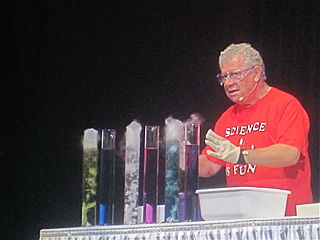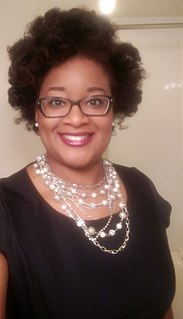
Ira Remsen was a chemist who, along with Constantin Fahlberg, discovered the artificial sweetener saccharin. He was the second president of Johns Hopkins University.

The American Chemical Society (ACS) is a scientific society based in the United States that supports scientific inquiry in the field of chemistry. Founded in 1876 at New York University, the ACS currently has nearly 157,000 members at all degree levels and in all fields of chemistry, chemical engineering, and related fields. It is the world's largest scientific society by membership. The ACS is a 501(c)(3) non-profit organization and holds a congressional charter under Title 36 of the United States Code. Its headquarters are located in Washington, D.C., and it has a large concentration of staff in Columbus, Ohio.

George Andrew Olah was a Hungarian and American chemist. His research involved the generation and reactivity of carbocations via superacids. For this research, Olah was awarded a Nobel Prize in Chemistry in 1994 "for his contribution to carbocation chemistry." He was also awarded the Priestley Medal, the highest honor granted by the American Chemical Society and F.A. Cotton Medal for Excellence in Chemical Research of the American Chemical Society in 1996. According to György Marx he was one of The Martians.

Robert Howard Crabtree is a British-American chemist. He is serving as Whitehead Professor of Chemistry at Yale University in the United States. He is a naturalized citizen of the United States. Crabtree is particularly known for his work on "Crabtree's catalyst" for hydrogenations, and his textbook on organometallic chemistry.

Henry Frederick "Fritz" Schaefer III is a computational and theoretical chemist. He is one of the most highly cited chemists in the world, with a Thomson Reuters H-Index of 119 as of 2019. He is the Graham Perdue Professor of Chemistry and Director of the Center for Computational Chemistry at the University of Georgia.
Frank Albert Cotton was an American chemist. He was the W.T. Doherty-Welch Foundation Chair and Distinguished Professor of Chemistry at Texas A&M University. He authored over 1600 scientific articles. Cotton was recognized for his research on the chemistry of the transition metals.
Tobin Jay Marks is the Vladimir N. Ipatieff Professor of Catalytic Chemistry and Professor of Material Science and Engineering, Department of Chemistry, Northwestern University. Among the themes of his research are synthetic organo-f-element and early-transition metal organometallic chemistry, polymer chemistry, materials chemistry, homogeneous and heterogeneous catalysis, molecule-based photonic materials, superconductivity, metal-organic chemical vapor deposition, and biological aspects of transition metal chemistry.

Elizabeth Ann Nalley is an American chemist and professor of chemistry at Cameron University in Lawton, Oklahoma.

Mary Lowe Good is an inorganic chemist who has worked academically, in industrial research and in government. Dr. Good has contributed to the understanding of catalysts such as ruthenium which activate or speed up chemical reactions. She has held high-level positions in the academic, industrial, and government sectors, where she has been a strong proponent of science, science education, and women in science.

Bassam Z. Shakhashiri is a professor of Chemistry at the University of Wisconsin-Madison, where he is the holder of the William T. Evjue Distinguished Chair. An active advocate for science education, he is the author of multiple books of chemical demonstrations. He was the 2012 president of the American Chemical Society and has received numerous awards and honors.
David A. Tirrell is an American chemist and the Ross McCollum-William H. Corcoran Professor and Professor of Chemistry and Chemical Engineering at the California Institute of Technology (Caltech). A pioneer in the areas of polymer synthesis and protein biosynthesis, his research has a wide range of applications, including coatings, adhesion, lubrication, bioengineering and biomedical intervention. From 2012 to 2018, Tirrell was the Director of the Beckman Institute at Caltech. As of 2017, he serves as Caltech's Provost. He is one of very few American scientists to have been elected to all three branches of the United States National Academies: the National Academy of Science (2006), the National Academy of Engineering (2008), and the Institute of Medicine (2011).
Gordon G. Hammes is a Distinguished Service Professor of Biochemistry, Emeritus, at Duke University, Professor Emeritus at Cornell University, and member of United States National Academy of Sciences. Hammes' research involves the study of enzyme mechanisms and enzyme regulation.
Charles T. Kresge is a chemist and retired Chief Technology Officer (CTO) of Saudi Aramco. He was R&D Vice President at the Dow Chemical Company. His area of expertise is inorganic synthesis and his primary field of research is in the area of crystalline aluminosilicate materials, particularly for the discovery of mesoporous molecular sieves.

William McMurtrie was an American chemist.

Catherine T. Hunt is an American chemist. In 2007, she served as the president of the American Chemical Society (ACS). She was a director at Dow Chemical Company.
Marinda Li Wu is an American chemist, who has worked for more than 30 years in the chemical industry, primarily with Dow Chemical Company, in research and development and plastics marketing. She was involved in early research on the recycling of plastics and environmental sustainability. She has also worked as an entrepreneur, and founded the organization "Science is Fun!" to interest students in science. She holds 7 U.S. Patents.
The Society of Chemical Industry or SCI America is an independent learned society inspired by the creation of the Society of Chemical Industry (SCI) in London in 1881. Originally known as the New York Section, it was formed in 1894 and officially renamed the American Section in 1919. The main activity of the American Section is the awarding of several prizes in chemistry: the Perkin Medal, the Chemical Industry Medal and the SCI's Gordon E. Moore Medal. The American Section also works with the American Chemical Society (ACS) and others to support scholars in chemistry and chemical engineering.
Bruce Edward Bursten is an American chemist, professor of chemistry, and president of the American Chemical Society. He is provost at Worcester Polytechnic Institute. His research has specialised in inorganic chemistry and metal-containing molecules.

Charles C. Price was an American chemist and president of the American Chemical Society (1965). He taught at the University of Illinois at Chicago, the University of Notre Dame, and the University of Pennsylvania.

Malika Jeffries-EL is an Associate Professor of Chemistry at Boston University. She works on organic semiconductors for innovative electronic devices. She was elected as a Fellow of the American Chemical Society in 2018.














